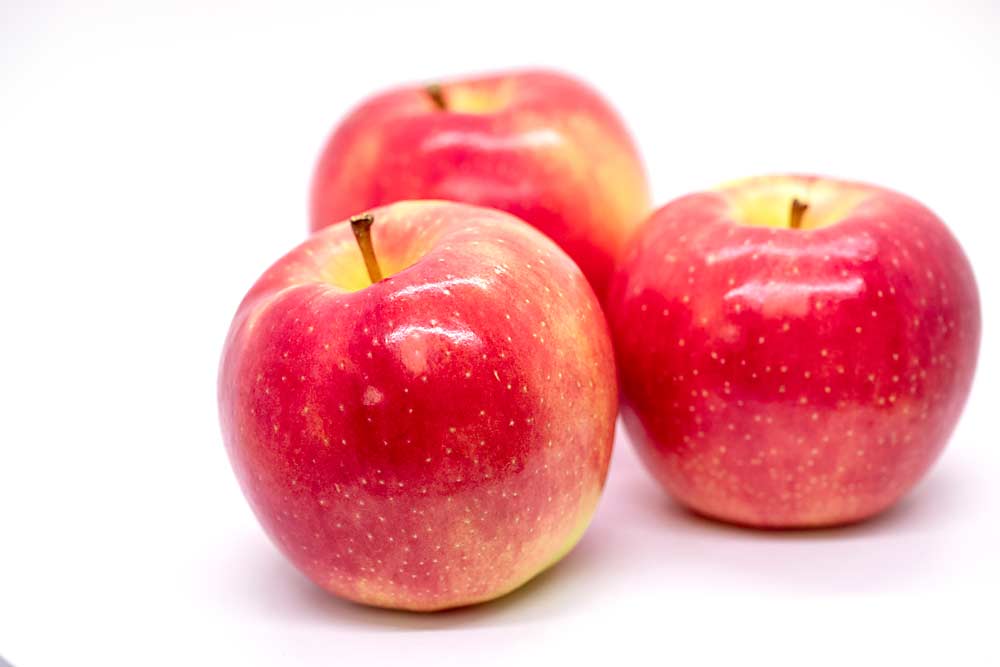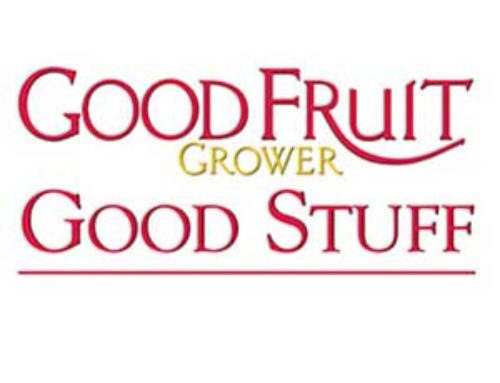
Washington State University is moving forward with its newest apple, a Honeycrisp and Cripps Pink cross patented as WA 64. The selection has been available for tasting during Washington Tree Fruit Research Commission research reviews, the Washington State Tree Fruit Association annual meetings and during spring field days hosted by breeder Kate Evans and WSU’s Tree Fruit Extension team. Consumers provided positive feedback at several events in 2022, including the Wenatchee Apple Blossom Festival and the Gilbert Cellars spring barrel days in Yakima.
How does the industry interact with WSU to have a voice in the process of releasing new apple and cherry cultivars? It generally follows a predetermined “dance pattern.” From the time the WSU breeding program made the cross to the day that the first commercially produced fruit will reach the hands of a consumer (best guess, to date, is late 2029), multiple interwoven steps must be taken to bring the new apple variety to market. Here we explain the process underway for WA 64:

Q. What guidelines govern the process?
In early 2023, the Washington Tree Fruit Research Commission led the development of a memorandum of agreement between the commission, Washington State University and the Oregon Sweet Cherry Commission to govern the WSU apple and cherry cultivar licensing committee. The commissions funnel grower money toward breeding efforts.
The agreement states: “WSU values input from industry participants regarding commercialization approaches and possible license structures for new apple and cherry cultivars, and this document outlines a formal arrangement for WSU to collect and reflect on feedback.”
General principles governing the cultivar licensing committee include:
1) All Washington growers should have fair and reasonable access to WSU apple and cherry cultivars, and all Oregon growers should have fair and reasonable access to WSU cherry cultivars;
2) The committee will strive to help ensure the commercial success of all apple and cherry cultivars;
3) WSU will consult with appropriate elements of the industry to develop and maintain appropriate commercial standards such as adequate propagation and intellectual property management; and
4) Royalty schemes will be established to support funding WSU’s apple and cherry breeding programs while considering profitability for growers.
The committee membership will be adjusted based on the cultivar to be commercialized. The licensing committee handling the WA 64 release consists of eight members and is chaired by Jeff Cleveringa, a research commission board member and orchard manager for Columbia Fruit Packers.
Other members are: Bruce Allen of Columbia Reach; Dan Plath of Washington Fruit and Produce Co.; Robert Kershaw of Domex Superfresh Growers; Dale Goldy of Gold Crown Nursery; and three of the authors of this column: Ines Hanrahan, executive director of the Washington Tree Fruit Research Commission; Kate Evans, WSU apple breeder; and Jeremy Tamsen, director of innovation and commercialization for WSU’s College of Agriculture, Human, and Natural Resource Sciences.
Q. How will this industry group work with WSU?
The cultivar licensing committee reports to the dean of WSU’s College of Agricultural, Human, and Natural Resource Sciences (CAHNRS), or a designee, who will consult with the WSU Office of Commercialization prior to making commercialization decisions. Recommendations submitted by the licensing committee must be approved by a majority vote. If a recommendation is approved by majority vote but does not receive unanimous approval, the committee shall also include the minority opinion in its recommendation to the dean.
The dean will ensure robust communication with members of the licensing committee during all steps in this process and will act in good faith. Final responsibility resides with the dean for ensuring decisions are fully explained to committee members, especially when the interests of WSU may not appear to be perfectly aligned with those of the industry.
The licensing committee also discusses the pipeline of elite selections, so that the release of variety information to growers occurs well within the pathway to commercialization. The formal recommendation to release a variety comes from WSU’s horticultural cultivar release committee (an ad hoc committee convened by the WSU horticulture department chair with invited stakeholder representation) following a proposal from the breeder.
Q. What are the duties of the cultivar licensing committee?
In regard to WA 64, the work of the committee is well underway. The licensing committee reviewed the recommendations of the WSU horticultural cultivar release committee to move forward with WA 64, and it will make recommendations along the commercialization path to develop a fair and equitable licensing agreement for the industry. The process will follow the same steps for future cultivar releases. Considerations include:
—Propagation of trees and budwood.
—Open release, exclusive or nonexclusive licensing.
—Naming of the cultivar and trademarking.
—Grade and pack standards.
—International intellectual property strategies.
—Potential royalty rates on trees and production.
—Any other relevant aspects of the commercialization process.
The licensing committee assisted with the development of the announcement of opportunity WSU publicized in June. For future cultivar releases, the committee will make recommendations on licensing and commercialization criteria such as:
—Propagation, management, intellectual property protection, communication to the industry and/or marketing brand development of the new cultivar.
—Fair and reasonable access for all Washington apple and cherry producers and Oregon cherry producers (for cherry releases), with no onerous provisions.
—Adoption and commercial success of the new cultivar.
The licensing committee will then evaluate responses to the commercial announcement and recommend, via vote, the preferred candidate to lead the commercialization. For WA 64, the decision is expected this fall.
Once a commercialization partner is selected, the licensing committee will provide strategy and licensing agreement recommendations in consultation with the CAHNRS dean. Following discussion with the breeder, the dean then works with the WSU Office of Commercialization for approval. The final version of the license agreement will be presented to the licensing committee and discussed prior to implementation, with feedback noted.
Finally, seven years following the execution of the originating licensing agreement, the committee will conduct a formal review of each license agreement and recommend any adjustments via vote.
Q. What are the next opportunities for industry members to experience WA 64?
WSU researchers received Washington State Department of Agriculture Specialty Crop Block Grant funding to establish both a research planting at WSU’s Sunrise orchard and a demonstration planting at WSU’s Roza orchard. Led by Kate Evans, along with horticulture professor Stefano Musacchi and extension specialist Bernardita Sallato, WA 64 trees on rootstocks G.41, G.969, G.890 and B.9 were planted in 2022 in both spindle and bi-axis systems. Fall field events are planned at both locations. (Visit treefruit.wsu.edu for more information and directions. To download a one-page fact sheet in English and Spanish, go to: treefruit.wsu.edu/wa-64-resources.).
Fruit samples will be distributed based on an “industry excitement plan” approved by the licensing committee. This document was prepared to clarify the distribution of all WA 64 samples harvested in 2022 and 2023 from each of two Phase 3 locations (Prosser and Quincy). For example, samples will be available during the fall WSU WA 64 field days and winter meetings and will be distributed to sales desks.
When the industry gathers for the Washington State Tree Fruit Association Annual Meeting in December in Kennewick, a session will focus on presenting this road to release to the broader community, to enable the mutual exchange of questions and concerns.
All new information and updates will be posted at: treefruit.wsu.edu and will also be featured in the Fruit Matters newsletters.
—by Kate Evans, Ines Hanrahan, Jeremy Tamsen and Deah McGaughey
Kate Evans is a pome fruit breeder at Washington State University, Ines Hanrahan is executive director of the Washington Tree Fruit Research Commission, Jeremy Tamsen is director of innovation and commercialization for WSU’s College of Agriculture, Human, and Natural Resource Sciences and Deah McGaughey is a technology licensing associate in the WSU Office of Commercialization.






Leave A Comment